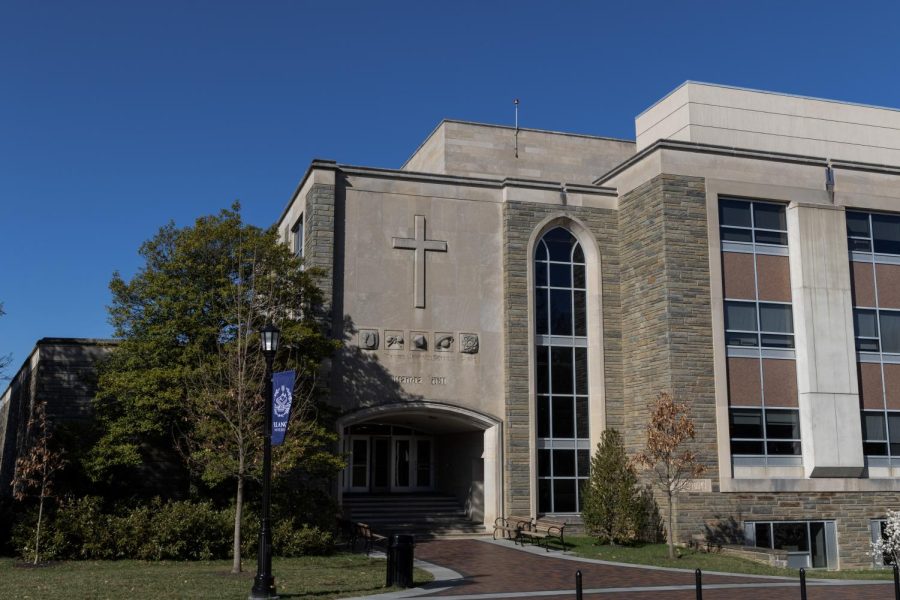Class Spotlight: Vaccines and Public Perception
April 26, 2023
As a professor in the Biology Department and the co-director of Villanova’s Comprehensive Science Program, Dr. Joseph Comber works mainly with science majors, with one exception: his Vaccines and Public Perception students.
Part of Villanova’s Mendel Science Experience, MSE 2211 is designed specifically for non-science majors in the College of Liberal Arts and Sciences.
For the past five years, Comber has given non-science students a glimpse into the world of vaccines. In this class, students learn about the history of vaccination, read a book entitled The Doctor Who Fooled the World, discuss anti-vaccination movements, take cultures of bacteria and create fake antibiotics during lab.
Comber’s own interest in vaccines and his passion for teaching inspired him to teach this class.
“I’ve always been interested in vaccine science and the discussion around the importance of vaccines,” Comber said. “I combined my love of teaching with my interests in vaccine science and developed this course, mostly to talk with people in the public about complex scientific issues in a way that is understandable.”
As a class of students of many majors, everyone brings something different to the labs and lectures. Students in this class have frequently shared perspectives that traditional science students overlook.
“I hear a lot of non-science majors in the class say, ‘I’m not good at science,’ but I don’t think that’s true,” Comber said. “I think for these students, their interests are focused in different areas, and they gravitate towards those majors when entering college. Non-science majors bring a slightly different perspective to the table. A lot of times this means that our discussions in class focus more on the broader, non-science impact of vaccination.”
While all MSE classes are made up of non-science majors, this class is different from the rest because it is ungraded.
The only grade that students receive is a final grade at the end of the semester. This grade is agreed and decided upon by Comber and each student based on individual goals, participation and performance on papers and projects.
When asked why he adopted this approach, Comber was open about his own views on grades and how detrimental they can be to a student’s growth.
“Grades aren’t really reflective of how much a student understands, learns or grows throughout a course,” Comber said. “We know that grades are not a great motivator for learning in the classroom and there is quite a bit of evidence that grades stifle creativity. Over the years, I’ve seen that students come to class less stressed about tests and quizzes and feel more comfortable participating and being creative in their papers and projects.”
Instead of making his students write lab reports or take exams, Comber has replaced these with paper assignments and projects.
Comber has also designed labs to be fun rather than something to lose sleep over. He uses them as a way of helping students get hands-on experience with content from lectures, but in a stress-free environment.
Playing the board game “pandemic” and analyzing bacteria from shoes, door handles and soap dispensers are all activities done during the lab.
Students genuinely look forward to this class. They know they are going to learn something but in a fun and memorable way.
One of these students is junior Dan Arcilla. Arcilla, who is studying economics, learned about this class from his roommate.
“I took this class because I was interested in learning more about vaccines, and my roommate took the class before and recommended it.” Arcilla said. “I have learned a lot of things from taking this class that I did not know before. There are many misconceptions about vaccines and this class will allow [students] to learn more about them.”
Arcilla is not alone in his appreciation for this class. Sophomore Ava Tower has also truly enjoyed her time as Comber’s student.
“My favorite thing we’ve done in class is definitely labs,” Tower said. “I never thought I would be culturing bacteria or anything like that, but Dr. Comber makes the class so fun, as well as easy to understand as a non-science major.”
As someone pursuing a B.A. in psychology, Tower was initially intimidated at the thought of having to take a science class, but that quickly changed after meeting Comber and understanding his philosophy.
“This MSE course has made science less daunting for me,” Tower said. “While the material is science-based, I feel as though there are many ways you can interpret what Dr. Comber teaches us and apply it to your own major.”
Along with Tower and Arcilla, junior Maddie Stewart is also glad she decided to take this class. As a political science major, Stewart had a great experience in her first MSE and is grateful that Comber provided a similar experience.
“I’ve been extremely fortunate to take two incredible MSEs,” Stewart said. “My first was Heredity and Human Affairs with Dr. Winterton, which is another amazing MSE.”
When asked if she would recommend these MSEs, Stewart mentioned that this is something she is actively doing.
“I have already been recommending both to all my peers,” she said. “They both create comfortable environments for non-science majors, while providing interesting and engaging material.”
Vaccines are a controversial topic, and talking about them can sometimes be uncomfortable but Comber and his students have created a space where all views and backgrounds are welcome, which is a rule established on the first day.
“I want students to feel comfortable sharing their opinions and not feel like their opinions must conform to mine or others in the class,” Comber said. “That’s one of the things that makes this class most enjoyable, [that] we don’t all agree about everything. Sure, we may agree vaccines are important, but we might not agree on mandatory vaccinations or something like that. The only way we promote discussion in the classroom is to ensure that everyone’s voices are heard and are equally important.”


